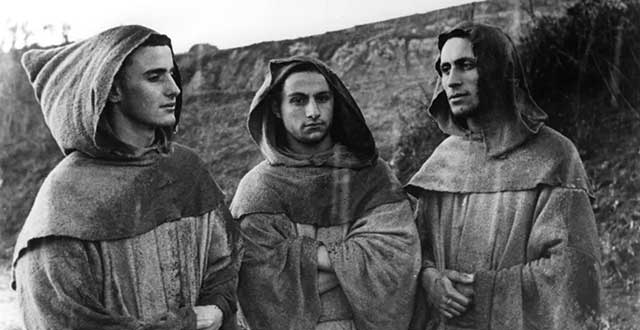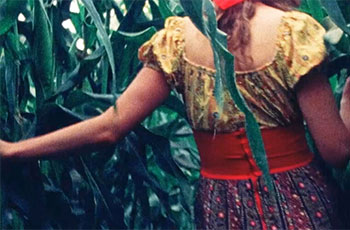
NOTES ON FILM & RESTORATION
07/08/2021When Roberto Rossellini was making his film Francesco, Giullare di Dio, he cast non-actors in every role (with the exception of Aldo Fabrizi as the invader Nicolaio). Francis and his followers were all played by Franciscan friars and novices, one of whom told Rossellini that he was a poet. “I asked him what kind of poetry he was doing,” said Rossellini in a 1971 Film Culture interview, quoted in Tag Gallagher’s definitive critical biography, The Adventures of Roberto Rossellini. “He said, ‘I wrote a poem about a rose.’ I asked him to tell it to me. He closed his eyes and lifted his face toward the sky and said, ‘Oh, Rose!’ And that was the whole poem. How can you have a better poem than that?”
The story exemplifies the spirit of Rossellini’s cinema, and of this film, which Pasolini called “among the most beautiful in Italian cinema” and which Truffaut called “the most beautiful film in the world.” In 1963, Truffaut wrote: “I know it’s a dangerous thing to say, but I believe it is true that Rossellini doesn’t really like cinema particularly, any more than he cares for the arts in general. He prefers life…He is an inquirer, a man who asks questions, who is much more interested in other people than he is in himself.” In other words, the cinema was not an end in itself for Rossellini, but a means of inquiry, exploration…revelation, and love.
The simplicity and directness of Rossellini’s greatest films—of which there are many—can be disarming, even shocking. At any given moment, one can hold them up against everything else in cinema and measure the distance of our collective focus from humanity itself—at this moment, it feels like light years. Certain of Rossellini’s films are demonstrative of his charity and compassion as an artist and as a human being, perhaps this one most of all (along with the film that followed, Europa 51), which remained a favorite throughout his life.
“I believe that certain aspects of primitive Franciscanism could best satisfy the deepest aspirations and needs of humanity who, enslaved by its greed and having totally forgotten the Povorello’s lesson, has also lost its joy in life.” Rossellini, far from setting out to tell the story of Francis’ life, focused instead on the relatively brief interval between his return from Rome, where Pope Innocent III gave Francis permission to start a new order, to the moment when he sent his followers out into the world. Francis himself isn’t even at the center of the film, and there is no narrative to speak of but is instead comprised of a series of episodes that Rossellini and his co-scenarist Federico Fellini drew from the Little Flowers of St. Francis and other texts including the Life of Brother Ginepro. Francis and his band of brothers meet every circumstance with acceptance, compassion and joy, and thus freedom. All gestures are equal, from the brothers stomping with joy through the pouring rain to Brother Ginepro meeting every act of brutality from Niccolaio and his men with a gentle smile to the indelible sequence in which Francis hears the tinkling of an approaching leper’s bell and stands up to embrace him. “Saint Francis called himself a jester, a clown, a juggler,” Rossellini said to an audience of Yale students in 1974, “because he wanted to make fun of all sorts of pride, because the main point was that from a very humble position you can face everything and you can revise the whole conception of the universe.” And to quote Gallagher’s fine words: “Francis, with Zen-like calm, has only to raise an arm to move the universe.”
Like most of Rossellini’s work, Francesco, Giullare di Dio has always been rough around the edges, hand-crafted. It has also been in need of a serious restoration, the better to give those rough edges their proper presence. This has finally happened, a collaboration between the Cineteca di Bologna and The Film Foundation, and it’s being presented in Cannes as we speak and later this month in Bologna.
- Kent Jones
Follow us on Instagram, and Twitter!
FRANCESCO, GIULLARE DI DIO (THE FLOWERS OF ST. FRANCIS) (1950, d. Roberto Rossellini)
Restored by The Film Foundation and Cineteca di Bologna at L'Immagine Ritrovata in collaboration with RTI-Mediaset and Infinity+. Restoration funding provided by the Hobson/Lucas Family Foundation.
